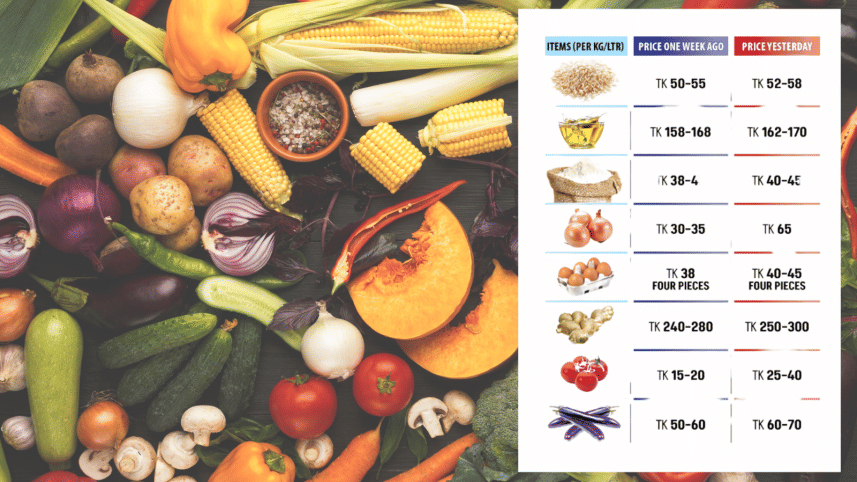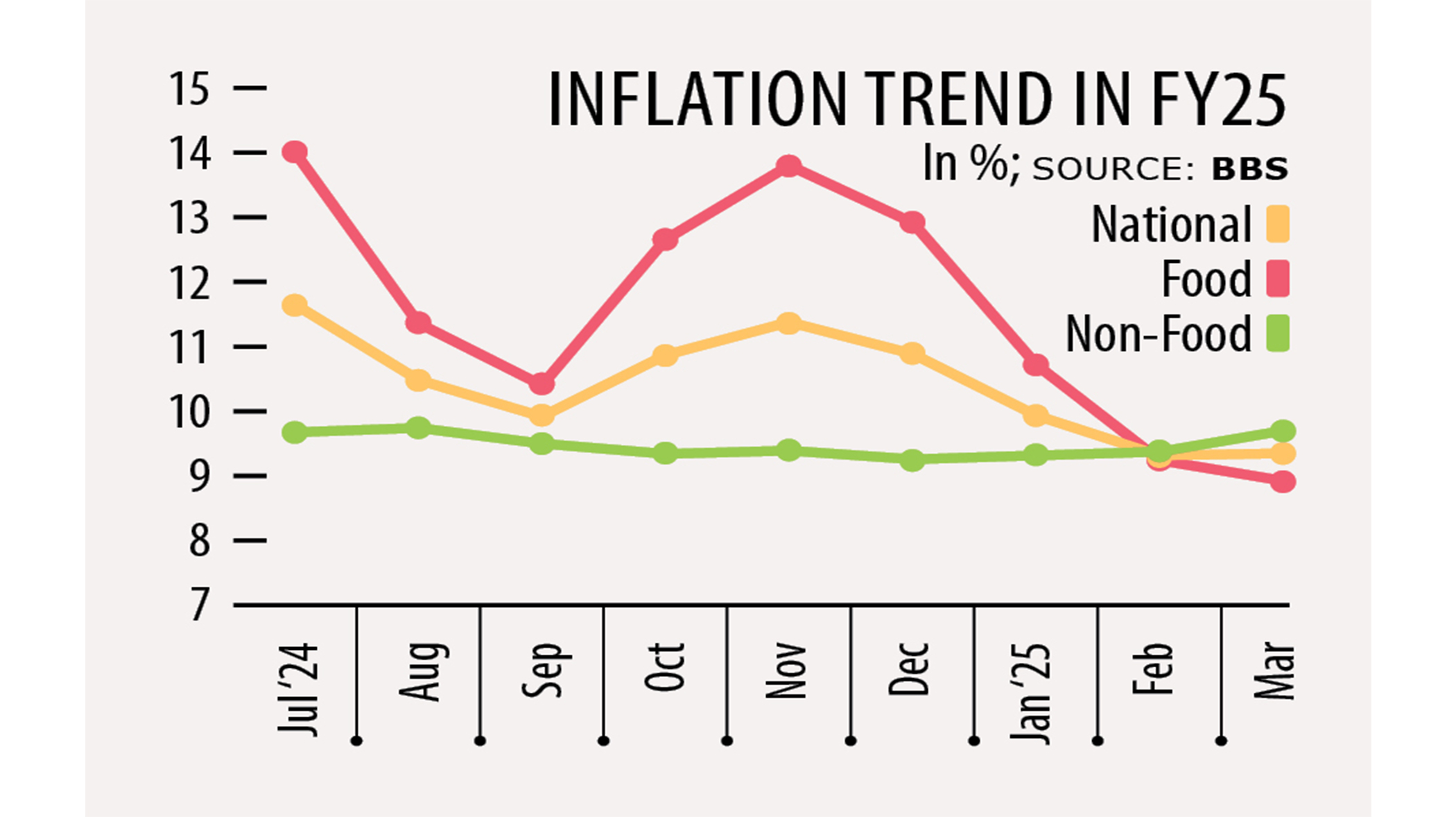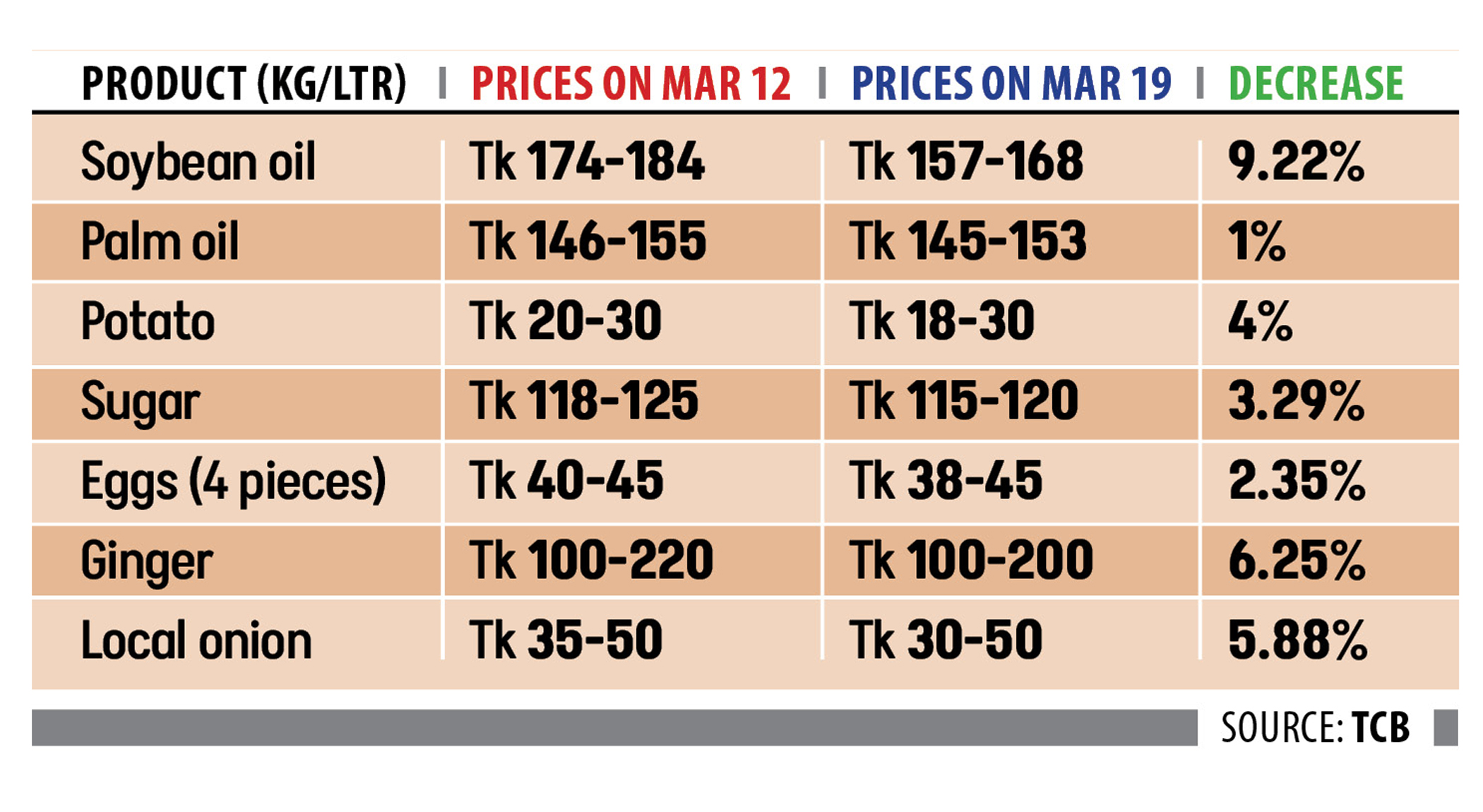Essential commodities: Price spiral hits fixed-income families hard

After a brief respite during Ramadan, the prices of rice, oil, eggs, onions, flour, and other essentials have risen again, putting more financial strain on low- and fixed-income families.
Supply chain experts and consumer rights activists blame the absence of consistent market monitoring, dwindling supply of winter vegetables, and the end of VAT exemptions granted during Ramadan.
This happens at a time when the government is trying to curb inflation, which was above 9 percent in March.
At kitchen markets in Mirpur-1, Duaripara, New Market, Moghbazar, Karwan Bazar, and Hatirpool, shoppers yesterday said almost every essential cost more than they did a week ago.
"The government has removed the VAT exemption for edible oil. Does it no longer feel it has responsibility to the general public?" said Nokib Hassan, a resident of Mirpur in the capital.
A shopper in Moghbazar, Himel Sarkar, echoes the sentiment: "If the government could control prices during Ramadan, why can't it do that now?"
According to retailers and Trading Corporation of Bangladesh (TCB) data, each kg of coarse rice now sells for Tk 52-58, up from Tk 50-55, and fine rice for Tk 88-90, up from Tk 85-88.
Non-bottled soybean oil sells for Tk 162-170 per litre, up from Tk 158-168; palm oil for Tk 145-156 per litre, up from Tk 144-150; non-packaged flour for Tk 40-45 per kg, up from Tk 38-45; and brown eggs for Tk 40-45 for four pieces, up from Tk 38.
Onions have seen the sharpest rise with the Bangladeshi variant being priced at Tk 65 per kg, an increase of Tk 30-35.
Local garlic is priced at Tk 200-220 per kg, up from Tk 190-220; ginger at Tk 250-300, up from Tk 240-280; small cardamoms (elaichi) at Tk 4,600-5,100, up from Tk 4,500-5,100.
According to TCB data, retail prices have increased by 1.90 percent for coarse rice, 2.41 percent for non-packaged flour, 1.84 percent for non-bottled soybean oil, 2.38 percent for non-bottled palm oil, 1.64 percent for super palm oil, 38.16 percent for local onions, 2 percent for broiler chicken, and 2.41 percent for eggs.
Of the 14 vegetables tracked by the Department of Agricultural Marketing, seven have become pricier over the last month.
Tomatoes are now Tk 25-40 per kg, up from Tk 15-20; eggplants Tk 60-70 per kg, up from Tk 50-60; and gourds Tk 55-60 apiece, up from Tk 35-40.
Aurangazeb Lablu, who runs a wholesale store at Karwan Bazar, says, "The supply of winter vegetables has ended. Since it is early in the season for the ones grown in summer, the prices are high."
The price of bottled soybean oil has increased by Tk 14 per litre and palm oil by Tk 12 after the government removed VAT exemptions.
Commenting on the matter last week, the commerce adviser Sheikh Bashir Uddin said that the price has been raised in the local market in line with international prices, as the government reduces subsidies and aims to increase revenue collection
Amanat Ullah, a wholesale egg trader in Tejgaon, says the demand has risen after offices and educational institutions reopened after Eid, resulting in price hike. He also said that demand is in line with the supply.
"Even though it is currently onion season in the country, imported onions are not available in the market as per demand, as a result, prices are on the rise," said Mohammad Abdul Mazed, general secretary of the Shyambazar Onion Wholesalers Association, a major onion-selling hub.
Yesterday, local onions were sold wholesale for Tk 46 to Tk 48 per kg, up from Tk 30 to Tk 32 just a week ago, he added.
Md Abdur Rahim, director of the plant quarantine wing of the Department of Agricultural Extension, said it's currently onion season in the country. So, to protect local farmers, the government has suspended import permissions for onions since the end of last March.
Traditional onions are cultivated from mid-December and arrive in markets by March or April the following year.
WHAT EXPERTS SAY
Zahid Hussain, former lead economist at the World Bank's Dhaka office, says the government is focused on raising revenue and cutting subsidies to meet the conditions set by the IMF.
"In order to be eligible for the next IMF tranches, the government must boost revenue," he opines.
Prof Jahangir Alam of the Department of Agribusiness and Marketing at Bangladesh Agricultural University says Ramadan coincided with the abundance of winter vegetables, helping keep the prices down.
"It is no longer winter, and summer produce is costlier. Besides, during Ramadan, policy steps helped stabilise the market. Such measures are now missing," he says.
He added that extortion by political parties was also a reason for higher prices.
SM Nazer Hossain, vice-president of the Consumers Association of Bangladesh, suspects that the government prioritises business interests over public welfare.
"A day after raising soybean oil prices, it waived 5 percent advance income tax on its import," he says.
The government claims it wants revenue, but it offers tax-break to businesses. "This indicates that protecting business interests has taken precedence over public welfare."
He urged the government to revise the taxes on essentials.
Besides, the government should take action against cartels that manipulate the market, he adds.





 For all latest news, follow The Daily Star's Google News channel.
For all latest news, follow The Daily Star's Google News channel. 

Comments